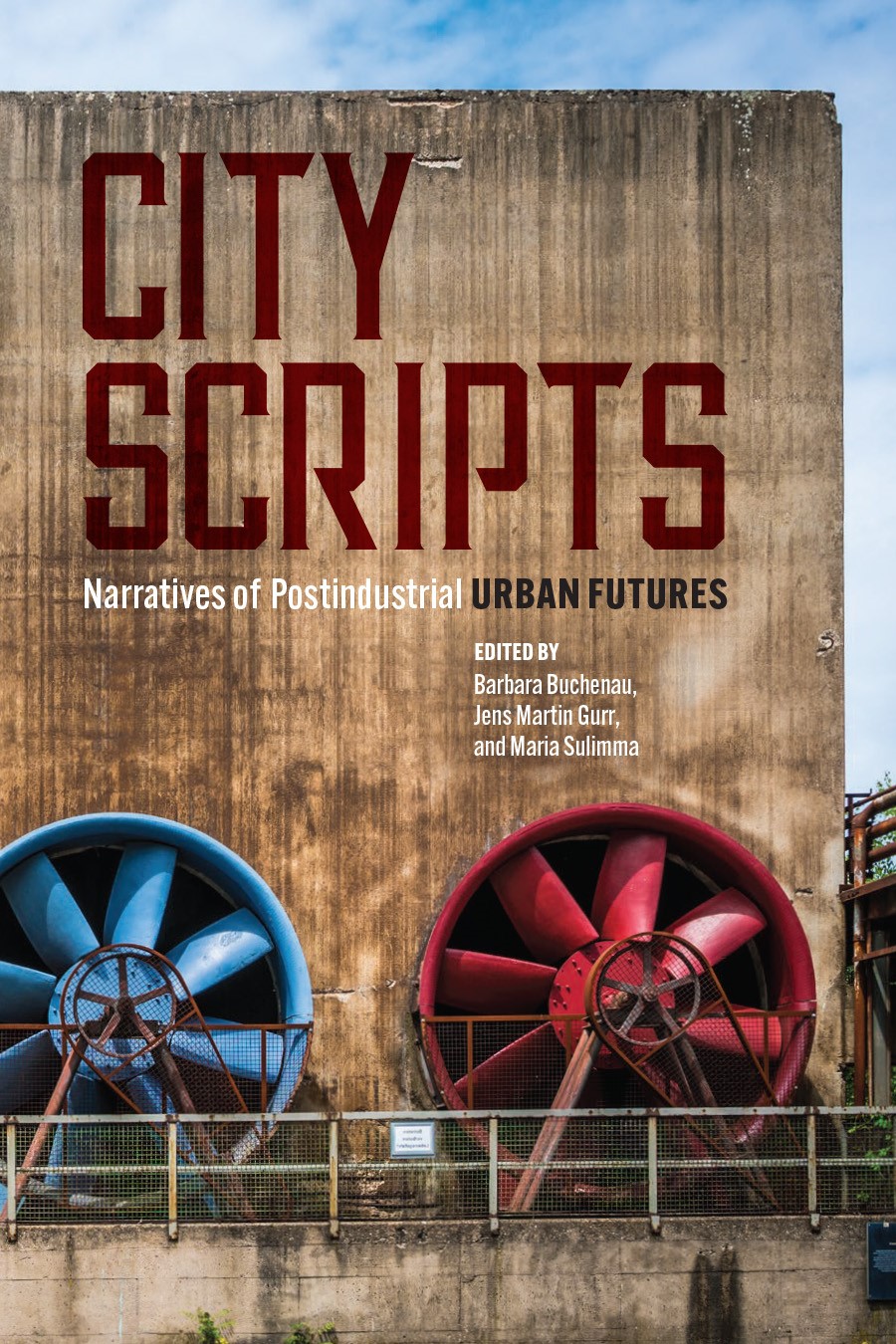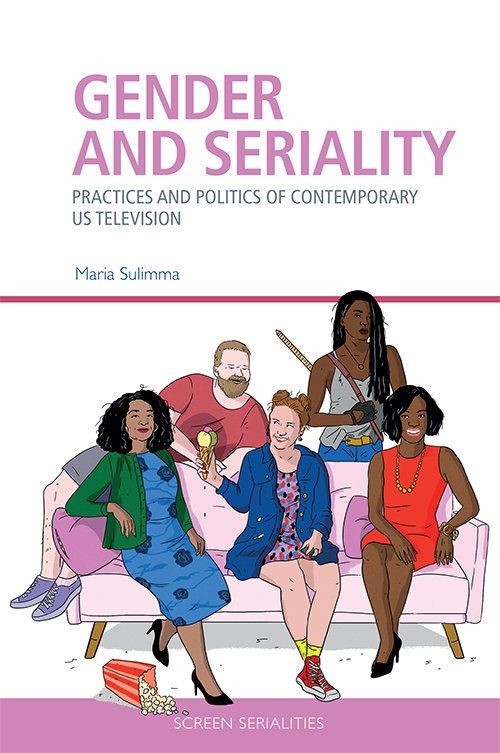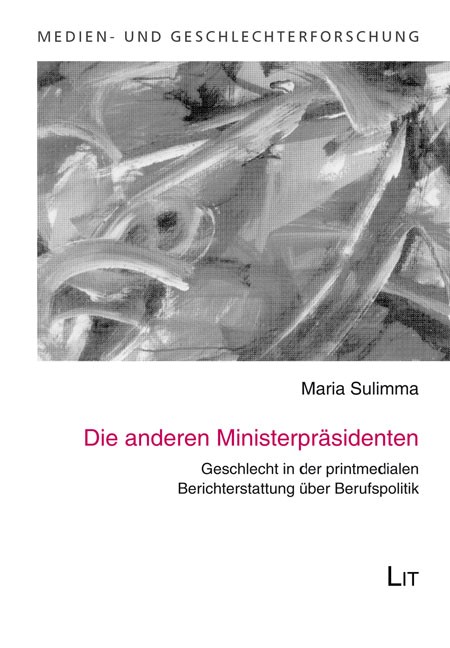Sulimma | Publications
Monographs and Edited Volumes
 |
 |
 |
City Scripts: Narratives of Postindustrial Urban Futures. Co-edited with Barbara Buchenau and Jens Martin Gurr, the Ohio State University Press (2023).
Gender and Seriality: Practices and Politics of Contemporary US Television. Edinburgh: University Press, 2021.
Die anderen Ministerpräsidenten – Geschlecht in der printmedialen Berichterstattung über Berufspolitik. Berlin: LIT Verlag, 2014.
Articles
- With Anthony P. McIntyre, Diane Negra, and Eleanor O'Leary. “Puppy Power: Mapping Modes of National Canine Cuteness and Patriotism” ASAP/Journal 9:3 (2025): 531-558.
- “Dilemma as Technique: Sarah Schulman’s Queer Detective Fiction and Gentrification” English Studies, 2025
- With Eva von Contzen, Stefan Pfänder, and Uta Reinöhl. “Repetition, again. Cross-disciplinary Approaches to Practices and Forms of Repeating.” Diegesis 13.2 (2024): 138-159.
- With Hanna Henryson. “Nothing was solved, only accelerated: Contemporary Berlin Novels as Gentrifictions.” Narrative 32:1 (2024): 60-79.
- “Gender Studies meets Seriality Studies: Fernsehen und Intersektionale Geschlechtlichkeit.“ Handbuch Televisuelle Serialität, edited by Sven Grampp and Olga Moskatova. Springer, 2024.
- “Urban Backwardness: Fantasies of the Village in the City.” Dossier “Backwardness: Rethinking Modernity, Conceptualizing Change,” edited by Kathleen Loock and Ruth Mayer. Amerikastudien / American Studies 68.3 (2023): 319-321.
- with Barbara Buchenau and Jens Martin Gurr. “City Scripts in Urban Literary and Cultural Studies.” City Scripts: Narratives of Postindustrial Urban Futures, edited by Barbara Buchenau, Jens Martin Gurr, and Maria Sulimma, Ohio State University Press, 2023. 1-24.
- “To the Bodega or the Café? Microscripts of Gentrification in Contemporary Fiction.” City Scripts: Narratives of Postindustrial Urban Futures, edited by Barbara Buchenau, Jens Martin Gurr, and Maria Sulimma, 2023. 138-155.
- ‘“To live in a city is to consume its offerings’: Speculative fiction and gentrification in Ling Ma’s Severance (2018).” Journal of Urban Cultural Studies, Special Issue “Representing Urban Change beyond Gentrification,” 10:1 (2023): 95–112.
- “‘I am not by any stretch a gardener, just curious’: Feminist Gentrifier Memoirs and an Ethics of Urban Gardening.” Ecozon@, Special Issue “Gardening (against) the Anthropocene,” 14.1 (2023): 70-86. Open access.
- With Julia Leyda. “Pop/Poetry: Dickinson as Remix.” Arts 12.2 (2023). https://doi.org/10.3390/arts12020062. Open access.
- “Recursive Cities: Seriality and Literary Urban Studies.” Companion of Literary Urban Studies, edited by Lieven Ameel. Routledge, 2023. 87-102.
- “Scripting Urbanity through Intertextuality in N.K. Jemisin’s The City We Became: I’m Really Going to Have to Watch Some Better Movies about New York.” Critique: Studies in Contemporary Fiction 63.5 (2022): 571-586.
- “Needs to Be More Explicit about the Methodologies…: Reluctance, Collaboration, and Vulnerability in Research Processes.” Dossier “Method as Practice,” edited by Ilka Brasch and Alexander Starre. Amerikastudien / American Studies 67.1 (2022): 14-16.
- “Sorting through Feminist Cabinets with Clare Hemmings’s Why Stories Matter (2011).” Culture^2: Theorizing Theory for the Twenty-First Century, Vol.1, edited by Frank Kelleter and Alexander Starre. transcript, 2022. 127-142. Open Access.
- “Wieviel Hitze verträgt ein Trinkwasserspender? Zur gegenderter Kanonbildung, Legitimität und einer kritischen Sphäre des Fernsehens.” Realität in Serie: Realitätsbehauptungen und -effekte in Fernsehserien, edited by Katja Kanzler, Stefan Schubert, and Sophie Spieler. Springer, 2022. 105-127.
- “Surviving the City: Zombies, Run! and the Horrors of Urban Exercise.” Playing the Field II: American Studies, Video Games, and Space, edited by Dietmar Meinel. De Gruyter, 2022. 223-240.
- “The Plane, the City, the Chase: Killing Eve and European Aviation Culture.” Dossier “Contemporary US Television and/in the Banal Anthropocene,” edited by Diane Negra and Julia Leyda. Screen 62.1 (2021): 107-115.
- “Defined by Distance: The Roadtrip and Queer Love in Alice Isn’t Dead.” Special Issue “Feminism, Gender, and Podcast Studies,” edited by Julia Hoydis. Gender Forum 77 (2020): 69-89. Open Access.
- with Julia Havas. “Through the Gaps of My Fingers: Genre, Femininity, and Cringe Aesthetics in Dramedy Television.” Television & New Media 21.1 (2020): 75-94.
- “‘Sir, she can hear you‘: The Mute White Woman as Cinematic Meditation on Gender, Communication, and Heterosexual Romance.” American Counter/Publics, edited by Ulla Haselstein, Frank Kelleter, Alexander Starre, and Birte Wege. Winter, 2019, 325-341.
- “Lena Dunham: Cringe Comedy and Body Politics.” Hysterical! Women in American Comedy, edited by Linda Mizejewski and Victoria Sturtevant. University of Texas Press, 2017. 379-401.
- “Simultaneous Seriality: On the Crossmedia Relationship of Television Narratives.” Special Issue “Serial Narratives,” edited by Kathleen Loock. Literatur in Wissenschaft und Unterricht 47.1-2 (2014): 127-143.
- with Bettina Soller. “‘It’s a great time to be a woman in politics!‘ – Serielle Verhandlungen von Politikerinnen als Protagonistinnen von US-Fernsehserien.“ Indes – Zeitschrift für Politik und Gesellschaft 4 (2014): 78-88.
- “Ein Aufschrei ohne Konsequenzen?“ Politische Kultur in der Krise: Jahrbuch des Göttinger Instituts für Demokratieforschung, edited by Alexander Hensel, Roland Hiemann, Daniela Kallnich, Robert Lorenz, and Katharina Rahlf. ibidem, 2014. 275-277.
- “‘Did you shoot the girl in the street?‘ – On the Digital Seriality of The Walking Dead.” Special Issue “Digital Seriality.”Eludamos: Journal for Computer Game Culture 8 (2014): 83-100. Open Access.
Blog Posts and Digital Essays
- “Trinkhallen Photography. The Many Visual Lives of the Ruhr Region’s Neighborhood Institution.” KWI-BLOG, July 2022. https://doi.org/10.37189/kwi-blog/20220706-0830.
- “COVID-19 and the Script of Urban Flight.” Theme Week “Scripting Urban Space during COVID-19.” In Media Res, Jan. 2021. https://mediacommons.org/imr/content/covid-19-and-script-%E2%80%9Curban-flight%E2%80%9D.
- with Bettina Soller. “I can’t identify myself as a woman! People can’t know that! – Female Protagonists in Current Political Drama and Comedy.” Theme Week “Representing Democracy.” In Media Res, Nov. 2014. http://mediacommons.org/imr/2014/10/27/i-cant-identify-myself-woman-people-cant-know-female-protagonists-current-political-drama.
- “The Fanboy next Door: Whedon and his Appeal to Self-Professed Geeks.” Theme Week “Much Ado About Joss Whedon.” In Media Res, Oct. 2013 (re-published Dec. 2013 as Retrospective Staff Selection). http://mediacommons.org/imr/2013/09/23/fanboy-next-door-whedon-and-his-appeal-self-professed-geeks.
Reviews
- “Kevin R. McNamara (ed.). The City in American Literature and Culture.” Amerikastudien / American Studies (forthcoming).
- “Stefan Schubert. Narrative Instability: Destabilizing Identities, Realities, and Textualities in Contemporary Popular Culture.” Zeitschrift für Anglistik und Amerikanistik 69.2 (2020): pp. 191-194.
- “Rubén Cenamor and Stefan Brandt (eds.). Ecomasculinities: Negotiating Male Gender Identity in U.S. Fiction.” Anglia - Journal of English Philology 138.1 (2020): 207-211.
- “Judith Kohlenberger. The New Formula For Cool: Science, Technology, and the Popular in The American Imagination.” Zeitschrift für Anglistik und Amerikanistik 65.2 (2017): 231-234.
- “Amanda Lotz. Cable Guys: Television and Masculinities in the 21st Century.” Literatur in Wissenschaft und Unterricht 47.1-2 (2014): 212-213.
- “Podcast Review Cable Guys: Television and Masculinities in the 21st Century (Amanda Lotz).” Critical Studies in Media Communication Podcast Series, March 2015. https://audioboom.com/boos/2944592-cable-guys-television-and-masculinities-in-the-21st-century.
- “Conference Report Internationale Konferenz der DFG Forschergruppe Ästhetik und Praxis populärer Serialität, 2013.“ Zeitschrift für Medienwissenschaft (Aug. 2013): www.zfmedienwissenschaft.de/index.php?TID=93.
- “Annika Bach, Katharina Fritsche, and Margreth Lünenborg. Migrantinnen in den Medien -Darstellungen in der Presse und ihre Rezeption.“ Femina Politica – Zeitschrift für feministische Politikwissenschaft 2 (2012): 198-200.
Newspaper Articles
- Focus. Dec. 2021. „Die neuen Fünfziger: Sex and the City Revival.” (interview: Birgit Querengäßer)
- Bayrischer Rundfunk. June 2021. “Herrscherinnen: Geschichten von Frauen und Macht.“ (interview: Vanessa Schneider)
- Die Rhein Pfalz Zeitung.“ Jan. 2018. Lange von Weißen Männern geprägt: Mediathek-Interview mit Maria Sulimma.“ (interview: Anne Lenhardt)
- PULS – Das junge Programm des Bayrischen Rundfunks. April 2017. “Spielwiese: Flashbacks auf der Couch: Warum Serien so besessen sind von der Vergangenheit.“ (interview: Verena Fücker)
- Deutschlandfunk Kultur- und Sozialwissenschaften. March 2014. “Schwerpunktthema: Frauen an der Macht.“ (interview: Christian Forberg)
- ER MAG – Geschichten über Männer (Konrad Adenauer Foundation). Nov. 2013. “Besorgte Versorger – die neuen alten TV-Väter.“ (interview: Dorothee Barsch)

